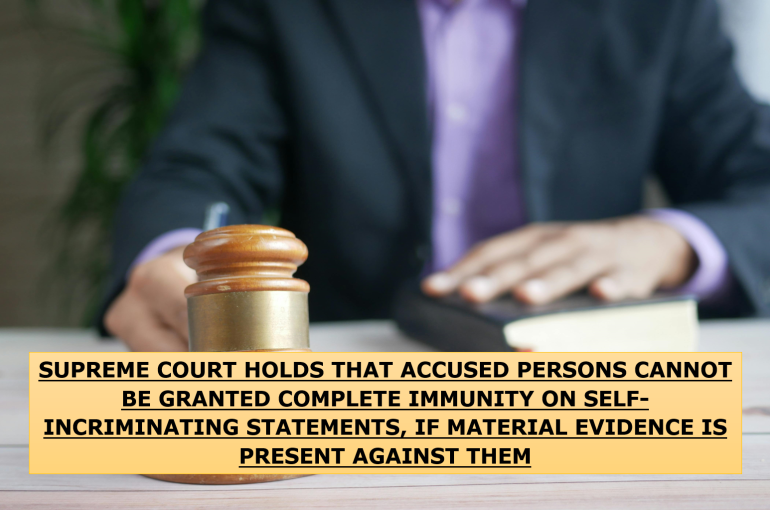SUPREME COURT HOLDS THAT ACCUSED PERSONS CANNOT BE GRANTED COMPLETE IMMUNITY ON SELF-INCRIMINATING STATEMENTS, IF MATERIAL EVIDENCE IS PRESENT AGAINST THEM
A two Judge Bench of the Hon’ble Supreme Court consisting of Justice Prashant Kumar Mishra and Justice Prasanna Bhalachandra Varale passed a judgement dated 10.09.2024 in Raghuveer Sharan V. District Sahakari Krishi Gramin Vikas Bank & Anr Criminal Appeal No. 2764 Of 2024 wherein the Bench held that witnesses can be summoned as accused even if self-incriminating statements are made by them.
Facts
In 1998, Smt. Savitri Shyam, mother of one, Rajendra Bharti, the President of the Respondent No. 1 Bank, District Sahakari Krishi Gramin Vikas Bank, moved an Application to create a Fixed Deposit (FD) in the Respondent No. 1 Bank amounting to Rs. 10,00,000/- (Rupees Ten Lakhs only) in her name for a period of 3 years. The said Respondent No. 1 Bank is now under liquidation. The amount was deposited in 2 separate deposits amounting to Rs. 8.5 Lakhs and Rs. 1.5 Lakhs.
Mr. Raghuveer Sharan (Appellant) was the cashier of the Respondent No. 1 Bank and he interpolated/altered the challans by changing the duration of the FDs. The Appellant changed the duration from 3 years to 10 years and then to 15 years into the books of the Bank and committed forgery.
When the Complaint was filed, the statement of the Appellant was recorded at Pre-Summoning stage wherein he admitted that he forged the records of the Bank. Later, during the course of the Trial, Mr. Narendra Singh (PW-1) was examined and he duly submitted that it was the Appellant who committed forgery in the Bank documents. Later, the Bank submitted an Application under Section 319 of Code of Criminal Procedure 1973 (CRPC) (Power to proceed against other persons appearing to be guilty of offence) to make the Appellant as an additional accused in the Trial.
The Ld. Trial Court, vide Order dated 17.04.2023, allowed the Application and summoned the Appellant as an Additional Accused and charges were framed against him on 15.06.2023.
The Appellant challenged the Summoning Order dated 17.04.2023 in the High Court of Madhya Pradesh, but the High Court dismissed the Criminal Revision Petition No. CRR-1925-2023 of the Appellant. Thus, the Appellant filed the present Appeal in the Supreme Court claiming that there was no prima facie evidence to summon him as an Accused in the Trial Court proceedings and a witness cannot be charged on the basis of self-incriminating statements.
Issues
(1) Whether the Appellant was summoned on the basis of self-incriminating statement given at pre-summoning stage?
(2) Whether the Trial Court summoned the Appellant as per the statement provided by the PW-1?
(3) Whether the Appellant was entitled to protection as per Section 132 of Indian Evidence Act 1872?
Decision of the Supreme Court
Before the Apex Court, the Appellant’s Counsel argued that the Appellant is entitled to immunity under Section 132 of the Indian Evidence Act 1872 (Witness not excused from answering on ground that answer will criminate) which protects a witness from prosecution based on self-incriminating statements. Moreover, there was no prima facie evidence against the Appellant, in order to summon him as an accused. The Supreme Court referred to the provision of Section 132 of the Indian Evidence Act and provided that Section 132 indeed protects witnesses, but this protection does not extend to cases where there is other material evidence against the individual apart from their statement.
The Apex Court emphasized on the fact that Section 132 only provides protection from self-incrimination based on a witness’s own testimony, but it does not provide blanket immunity where there is additional evidence of complicity. The Hon’ble Supreme Court observed that the Appellant was summoned because of PW-1’s statement which was made during the Trial and not on the basis of his own pre-summoning testimony.
The Apex Court also stated that if the immunity under Section 132 is provided to everyone without any proviso, then the process will be generally abused by accused persons as every accused will provide self-incriminating statements before the Court and claim immunity under the law.
Furthermore, the statement given by PW-1, Narendra Singh on 31.03.2022 categorically stated that the Appellant altered the bank documents as per his own will and this constitutes prima facie material for exercise of power under Section 319 CRPC.
Conclusion
The Hon’ble Bench dismissed the Appeal filed by the Appellant by concluding that the Trial Court had sufficient material to summon the Appellant based on the statement of PW-1. Therefore, the Bench upheld the Impugned Order dated 09.11.2023 of the Madhya Pradesh High Court that held that the Appellant’s plea that he was wrongfully summoned as an accused based on his self-incriminating statement, was unsustainable.
ARJAV JAIN
ASSOCIATE
THE INDIAN LAWYER & ALLIED SERVICES





































Leave a Reply